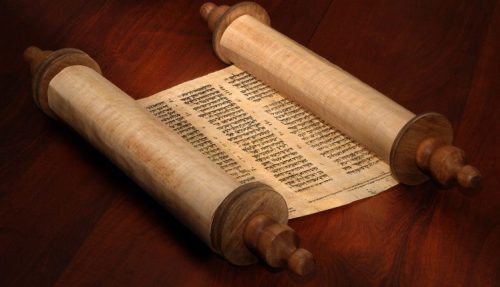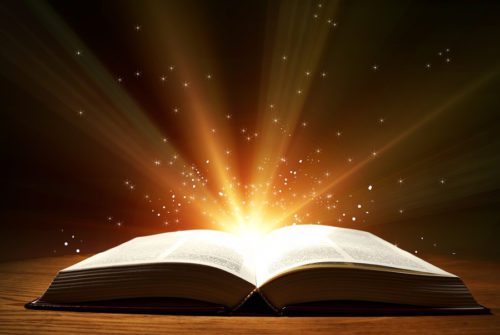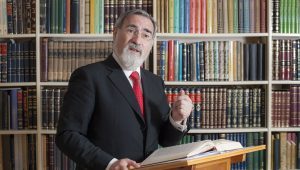

This week’s parsha relates a powerful, primal vision of prayer: Jacob, alone and far from home, lies down for the night, with only stones for a pillow, and dreams of a ladder, with angels ascending and descending. This is the initial encounter with the “house of God” that would one day become the synagogue, the first dream of a “gate of heaven” that would allow access to a God that stands above, letting us know finally that “God is truly in this place.”
There is, though, one nuance in the text that is lost in translation, and it took the Hassidic masters to remind us of it. Hebrew verbs carry with them, in their declensions, an indication of their subject. Thus the word yadati means “I knew,” and lo yadati, “I did not know.” When Jacob wakes from his sleep, however, he says, “Surely the Lord is in this place ve’anokhi lo yadati.” Anokhi means “I,” which in this sentence is superfluous. To translate it literally we would have to say, “And I, I knew it not.” Why the double “I”?
To this, Rabbi Pinchas Horowitz (Panim Yafot) gave a magnificent answer. How, he asks, do we come to know that “God is in this place”? “By ve’anokhi lo yadati – not knowing the I.” We know God when we forget the self. We sense the “Thou” of the Divine Presence when we move beyond the “I” of egocentricity. Only when we stop thinking about ourselves do we become truly open to the world and the Creator. In this insight lies an answer to some of the great questions about prayer: What difference does it make? Does it really change God? Surely God does not change. Besides which, does not prayer contradict the most fundamental principle of faith, which is that we are called on to do God’s will rather than ask God to do ours? What really happens when we pray?
Prayer has two dimensions, one mysterious, the other not. There are simply too many cases of prayers being answered for us to deny that it makes a difference to our fate. It does. I once heard the following story. A man in a Nazi concentration camp lost the will to live – and in the death camps, if you lost the will to live, you died. That night he poured out his heart in prayer. The next morning, he was transferred to work in the camp kitchen. There he was able, when the guards were not looking, to steal some potato peelings. It was these peelings that kept him alive. I heard this story from his son.
Perhaps each of us has some such story. In times of crisis we cry out from the depths of our soul, and something happens. Sometimes we only realise it later, looking back. Prayer makes a difference to the world – but how it does so is mysterious.
There is, however, a second dimension which is non-mysterious. Less than prayer changes the world, it changes us. The Hebrew verb lehitpalel, meaning “to pray,” is reflexive, implying an action done to one- self. Literally, it means “to judge oneself.” It means, to escape from the prison of the self and see the world, including ourselves, from the outside. Prayer is where the relentless first person singular, the “I,” falls silent for a moment and we become aware that we are not the centre of the universe. There is a reality outside. That is a moment of transformation.
If we could only stop asking the question, “How does this affect me?” we would see that we are surrounded by miracles. There is the almost infinite complexity and beauty of the natural world. There is the divine word, our greatest legacy as Jews, the library of books we call the Bible. And there is the unparalleled drama, spreading over forty centuries, of the tragedies and triumphs that have befallen the Jewish people. Respectively, these represent the three dimensions of our knowledge of God: creation (God in nature), revelation (God in holy words) and redemption (God in history).
Sometimes it takes a great crisis to make us realise how self- centred we have been. The only question strong enough to endow existence with meaning is not, “What do I need from life?” but “What does life need from me?” That is the question we hear when we truly pray. More than an act of speaking, prayer is an act of listening – to what God wants from us, here, now. What we discover – if we are able to create that silence in the soul – is that we are not alone. We are here because someone, the One, wanted us to be, and He has set us a task only we can do. We emerge strengthened, transformed.
More than prayer changes God, it changes us. It lets us see, feel, know that “God is in this place.” How do we reach that awareness? By moving beyond the first person singular, so that for a moment, like Jacob, we can say, “I know not the I.” In the silence of the “I,” we meet the “Thou” of God.
Shabbat shalom

 An international religious leader, philosopher, award-winning author and respected moral voice, Rabbi Lord Jonathan Sacks was awarded the 2016 Templeton Prize in recognition of his “exceptional contributions to affirming life’s spiritual dimension.” Described by H.R.H. The Prince of Wales as “a light unto this nation” and by former British Prime Minister Tony Blair as “an intellectual giant”, Rabbi Sacks is a frequent and sought-after contributor to radio, television and the press both in Britain and around the world.
An international religious leader, philosopher, award-winning author and respected moral voice, Rabbi Lord Jonathan Sacks was awarded the 2016 Templeton Prize in recognition of his “exceptional contributions to affirming life’s spiritual dimension.” Described by H.R.H. The Prince of Wales as “a light unto this nation” and by former British Prime Minister Tony Blair as “an intellectual giant”, Rabbi Sacks is a frequent and sought-after contributor to radio, television and the press both in Britain and around the world.
Since stepping down as the Chief Rabbi of the United Hebrew Congregations of the Commonwealth – a position he served for 22 years between 1991 and 2013 – Rabbi Sacks has held a number of professorships at several academic institutions including Yeshiva University and King’s College London. In addition to his writing and lecturing, he currently serves as the Ingeborg and Ira Rennert Global Distinguished Professor at New York University. Rabbi Sacks has been awarded 17 honorary doctorates including a Doctor of Divinity conferred to mark his first ten years in office as Chief Rabbi, by the then Archbishop of Canterbury, Lord Carey.
Rabbi Sacks is the author of over 30 books. Among them, Rabbi Sacks has published a new English translation and commentary for the Koren Sacks Siddur, the first new Orthodox siddur in a generation, as well as powerful commentaries for the Rosh HaShana, Yom Kippur, Pesach, Shavuot and Sukkot Machzorim. His most recent work, Not in God’s Name: Confronting Religious Violence was awarded a 2015 National Jewish Book Award in America and was a top ten Sunday Times bestseller in the UK. Past works include: The Great Partnership: God, Science and the Search for Meaning; The Dignity of Difference: How to Avoid the Clash of Civilizations, winner of the Grawemeyer Prize for Religion in 2004 for its success in defining a framework for interfaith dialogue between people of all faith and of none; To Heal a Fractured World: The Ethics of Responsibility; and A Letter in the Scroll: On Being Jewish, winner of a National Jewish Book Awards in 2000. His Covenant & Conversationcommentaries on the weekly Torah portion are read in Jewish communities around the world.
In recognition of his work, Rabbi Sacks has received, among others, the Jerusalem Prize in 1995 for his contribution to diaspora Jewish life, The Ladislaus Laszt Ecumenical and Social Concern Award from Ben Gurion University in Israel in 2011, The Guardian of Zion Award from the Ingeborg Rennert Center for Jerusalem Studies at Bar-Ilan University in 2014, and The Katz Award in recognition of his contribution to the practical analysis and application of Halakha in modern life in Israel in 2014. He was named as The Becket Fund’s 2014 Canterbury Medalist for his role in the defence of religious liberty in the public square; won a Bradley Prize in 2016 in recognition of being “a leading moral voice in today’s world”; and in 2017, he was awarded the Irving Kristol Award from the American Enterprise Institute for his “remarkable contributions to philosophy, religion, and interfaith discourse… as one of the world’s greatest living public intellectuals.” In 2018, he was given the Lifetime Achievement Award by The London Jewish News in recognition of his services to the Jewish world and wider society.
Rabbi Sacks was knighted by Her Majesty The Queen in 2005 and made a Life Peer, taking his seat in the House of Lords in October 2009. Born in 1948 in London, he has been married to Elaine since 1970. They have three children and several grandchildren.